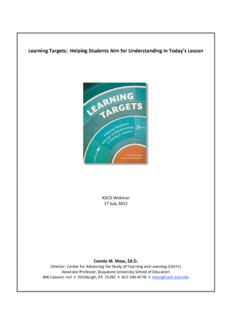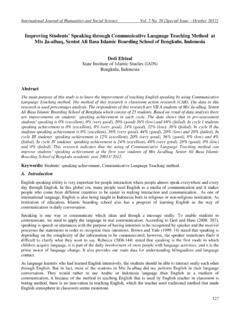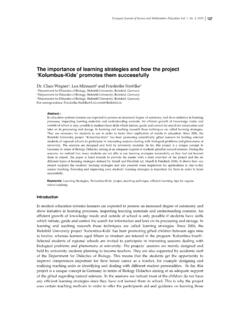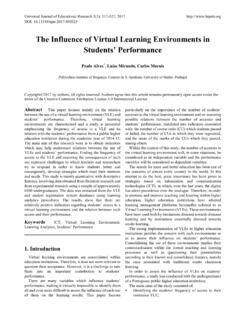Transcription of The Importance of Grades - University of Chicago
1 NEW KNOWLEDGEThe Importance of GradesNEW KNOWLEDGEThe Importance of GradesTHE BIG PICTUREDo Grades measure factors that matter for college success? High school course Grades are critical indicators of academic performance for students , educators, and institutions of higher education. At the same time, people are hesitant to put too much trust in course Grades as measures of students true achievement and academic readiness, often seeing them as subjective and inconsistent measures. However, a growing body of recent research documents their ability to predict students later outcomes, suggesting that Grades may not be as subjective a measure of student achievement as often thought. For example, a recent study by REL Northwest found that high school GPA was a stronger predictor of college course Grades than standardized test scores, including college entrance exam scores, among Alaskan high school graduates. This could be because Grades are thought to capture both students academic and noncognitive factors that play a role in academic success, such as perseverance and a positive mindset.
2 In a recent study, economist Kirabo Jackson used GPA as one measure of students noncognitive ability and found that noncognitive ability, which measures students engagement and effort in school, is a better predictor than test scores of college enrollment. These findings, as well as new work coming out of the University of Chicago Consortium on School Research (UChicago Consortium), suggest that there is potential for schools to use Grades not only as reliable indicators of student content mastery, but also as leading indicators of who will be successful in college. Schools can also use Grades to help identify students who may need additional supports in turning their high school experiences UEI KNOWLEDGEThe UChicago Consortium s newly published report The Predictive Power of Freshman Year High School GPA finds that, despite concerns about Grades having different meaning at different schools, ninth-grade GPA is a strong predictor of not only high school graduation (which previous research has shown), but also college enrollment and persistence.
3 Ninth-grade GPA is, in fact, a much stronger predictor of high school graduation, college enrollment, and college persistence than standardized test scores. Ninth-grade GPA is particularly important because ninth grade is a gateway year for success in high school and later in life. Further, most students have around the same GPA in 11th grade as they do in ninth grade. There is, however, more to learn on why Grades are so predictive of future outcomes and what attributes Grades are measuring in addition to content mastery. For example, Grades may also reflect students growth mindset or perseverance. Having high Grades across many classes may be evidence that students have successfully navigated different expectations and assignments across multiple teachers. The factors that teachers consider when giving Grades students attitudes, behavior, and effort are likely characteristics that students need in order to be successful in higher education and in the workforce.
4 The report also points to evidence that the work CPS has been doing to increase student performance in ninth grade is working. Grades have gone up across the board in CPS high schools with more students getting As and Bs and fewer students getting Fs. NEW KNOWLEDGEThe Importance of GradesAt the same time, there has been improvement on other indicators as well, such as test scores and attendance, suggesting that the increases in Grades reflect stronger student academics overall. An ongoing concern, however, are the large disparities that exist in the Grades received across subgroups of students . While Grades are a strong predictor of educational attainment for all student subgroups, and there have been improvements in Grades among all subgroups of students , there remain large differences in freshman GPA by gender and race. The distribution of ninth-grade GPA for eight cohorts (2006-13)Percent of : These are unadjusted differences (no controls for other variables).
5 students included in the sample were first-time ninth-graderswho attended non-charter, non-alternative CPS high ATINOBLACK920292912713223325271636393324 61125 STUDENT AVERAGE GRADE ACROSS COURSESP ercentage distribution of freshman year GPA by race/ethnicity from 2006 2013 NEW KNOWLEDGEThe Importance of GradesFuture research by the UChicago Consortium will focus on understanding these gaps in Grades , particularly the gender gap. Why do boys get lower Grades than girls even when comparing male and female students with the same test scores and in the same school? What can we learn about why boys seem to be at a disadvantage when it comes to Grades , and whether that is driven by structural factors or practices within schools? This continued research will help inform schools about why boys might be at a disadvantage to girls when it comes to Grades and what schools can do to help close those TO WATCHN ationally and locally, more organizations and schools are developing early warning systems for monitoring students Grades early in their high school National High School Center at the American Institutes for Research (AIR) recently developed an Early Warning Intervention and Monitoring System, which identifies ninth and tenth grade students who are at risk of not graduating on time, based on chronic absence and course failures.
6 The system then assigns those students to interventions and monitors their progress, aiming to get at-risk students back on track towards graduation. AIR conducted a trial of the monitoring system and found that it has significantly reduced the number of course failures among UChicago Consortium and the Network for College Success also developed an early warning indicator framework called the Risk and Opportunity Framework. The framework is designed to help high school educators understand incoming ninth-graders level of risk and opportunity for success in the ninth grade based on their eighth grade attendance and GPAs. It helps educators identify and target interventions to ninth graders who are at risk of falling off track or have the potential to earn Bs or better in their coursework and better monitor students course performance. These forms of early intervention are significant in putting more students on track toward not only high school graduation, but also college graduation, and we expect to see more of them as research reveals the Importance of ninth-grade GPA for future educational download the University of Chicago Urban Education Institute s full New Knowledge in Public Education Report, visit.









